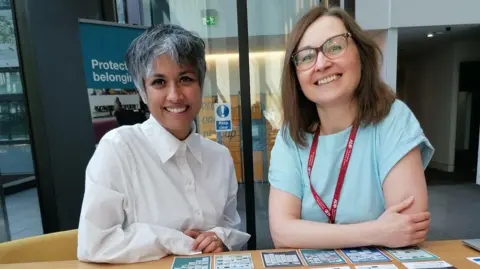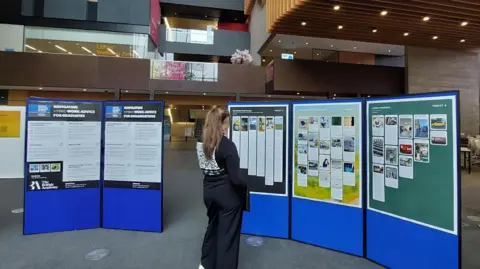Gen Z hybrid working stories explored in exhibition
 BBC
BBCAn interactive exhibition has showcased young people's "lonely", "productive" and "empowering" experiences within a hybrid work environment.
Navigating Hybrid Work, which is part of the Oxford Brookes University Think Human festival, explored both the challenges and the perks of this work model.
Research lead Sylwia Ciuk said the team had spent about 70 hours interviewing recent university graduates about their experiences.
Creative director Mitaali Katoch said she hoped the research would have an influence on policy, adding the team had submitted evidence to parliament, suggesting the need for more guidance around hybrid work which could promote workplace diversity.
Hybrid working means an employee works partly from an office and partly either from home or another location, as well as working with different people, and sometimes in different time zones.
 Sylwia Ciuk
Sylwia CiukRecent business management graduate Kofi Owusu-Aidoo, 24, works in a hybrid role and said a lot of young people "enjoy the flexibility and the empowerment" it offers.
Since April 2024, UK workers have had the right - introduced under the previous Conservative government - to ask for flexible working as soon as they start a job, but firms do not have to agree.
But Mr Owusu-Aidoo said many employers "are starting to recognise Gen Z and how to cater to their needs in the workplace".
"People like put their voices out to say, 'my employer trusted me and these are the results I've been able to produce', so showing these stories can be replicated across the country."

Gen Z represents about 27% of the workforce in 2025.
"We were interested in getting a broad range of perspectives, looking at both home graduates and international graduates," Ms Ciuk said.
They captured various work experiences, from large organisations, universities, and charities to start-ups and local administrations.

Ms Ciuk said "the saddest stories" from the research were linked to home situations where some people were "lonely".
Another had to work as a "tiny kitchen table".
"It was close to where all the traffic in the family was taking place, there was a dog that was barking all the time, there were a lot of deliveries because their mum did not realise that would actually be disturbing," she explained
She said many talked about the lack of financial resources to buy appropriate equipment which affected them physically and psychologically.
Ms Katoch said: "This project has legs to make a huge impact, to make a change."
Ms Ciuk said the team was "concerned about the increased popularity of the return to the office mandate".
"We see the new industrial strategy is also concerned with the issue of diversifying their workforce and opening opportunities for employment for wider groups," she continued.
She said that more guidance was needed on the eight reasons for refusing flexible work.
"Clearly, there are difficulties in terms of transitioning to this form of employment," she said.
"But we've spoken to people with neurodiversity and long-term illnesses and they told us that because of hybrid work, they are able to participate in employment to a much broader extend than they would have been without this."
Although the exhibition has now closed the team is still looking for more people to take part in the research.
You can follow BBC Oxfordshire on Facebook, X (Twitter), or Instagram.
